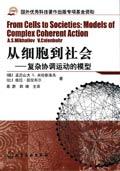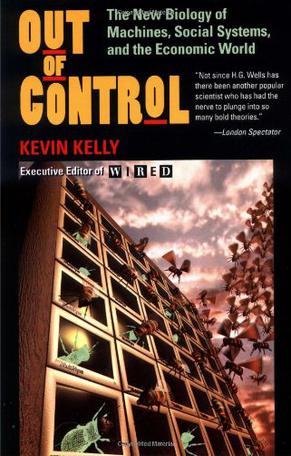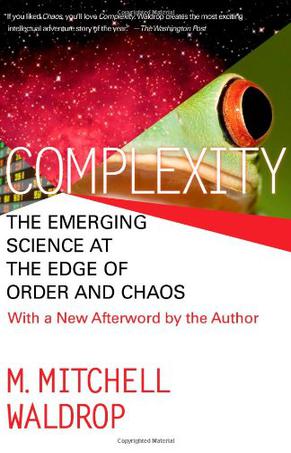-

涌现
作者比较了显示涌现现象的不同系统和模型,展现了它们之间共同的规则或规律。作者向读者阐明:涌现的理论能够预言许多复杂的行为,同时也给予我们关于生命、智慧和组织的很多启示。 -

从细胞到社会
本书是复杂性科学方面一本引人入胜的介绍性读物。作者由简到繁地介绍目前复杂性研究中遇到的各种典型系统,从无分化的相干运动集群到上具有内部动力学的单元模型,从相不干动作组的自发形成,到基层组织的出现等,直至动态网络的涌现和演化。通过对这些系统中反应——扩散耦合、主动运动、互相同步和聚类形成等现象的形成机理分析,深入浅出地阐述了复杂系统的重要共性和本质问题。 本书覆盖面较广,但自成体系,对理工科类的大学高年级学生和研究生及相关领域的广大科技工作者都具有重要的参考价值。 -

Out of Control
Out of Control is a summary of what we know about self-sustaining systems, both living ones such as a tropical wetland, or an artificial one, such as a computer simulation of our planet. The last chapter of the book, "The Nine Laws of God," is a distillation of the nine common principles that all life-like systems share. The major themes of the book are: As we make our machines and institutions more complex, we have to make them more biological in order to manage them. The most potent force in technology will be artificial evolution. We are already evolving software and drugs instead of engineering them. Organic life is the ultimate technology, and all technology will improve towards biology. The main thing computers are good for is creating little worlds so that we can try out the Great Questions. Online communities let us ask the question "what is a democracy; what do you need for it?" by trying to wire a democracy up, and re-wire it if it doesn't work. Virtual reality lets us ask "what is reality?" by trying to synthesize it. And computers give us room to ask "what is life?" by providing a universe in which to create computer viruses and artificial creatures of increasing complexity. Philosophers sitting in academies used to ask the Great Questions; now they are asked by experimentalists creating worlds. As we shape technology, it shapes us. We are connecting everything to everything, and so our entire culture is migrating to a "network culture" and a new network economics. In order to harvest the power of organic machines, we have to instill in them guidelines and self-governance, and relinquish some of our total control. -

Complexity
In a rented convent in Santa Fe, a revolution has been brewing. The activists are not anarchists, but rather Nobel Laureates in physics and economics such as Murray Gell-Mann and Kenneth Arrow, and pony-tailed graduate students, mathematicians, and computer scientists down from Los Alamos. They've formed an iconoclastic think tank called the Santa Fe Institute, and their radical idea is to create a new science called complexity. These mavericks from academe share a deep impatience with the kind of linear, reductionist thinking that has dominated science since the time of Newton. Instead, they are gathering novel ideas about interconnectedness, coevolution, chaos, structure, and order - and they're forging them into an entirely new, unified way of thinking about nature, human social behavior, life, and the universe itself. They want to know how a primordial soup of simple molecules managed to turn itself into the first living cell - and what the origin of life some four billion years ago can tell us about the process of technological innovation today. They want to know why ancient ecosystems often remained stable for millions of years, only to vanish in a geological instant - and what such events have to do with the sudden collapse of Soviet communism in the late 1980s. They want to know why the economy can behave in unpredictable ways that economists can't explain - and how the random process of Darwinian natural selection managed to produce such wonderfully intricate structures as the eye and the kidney. Above all, they want to know how the universe manages to bring forth complex structures such as galaxies, stars, planets, bacteria, plants, animals, and brains. There are commonthreads in all of these queries, and these Santa Fe scientists seek to understand them. Complexity is their story: the messy, funny, human story of how science really happens. Here is the tale of Brian Arthur, the Belfast-born economist who stubbornly pushed his theories of economic ch